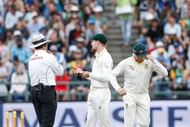
Cricket never seemed to have taken the back seat so often when old rivals clashed in a heated series like it did in the just-concluded battle between South Africa and Australia.
The last occurrence of such an ugly contest where the game was less spoken about was during India's home Tests against Australia in 2017. It produced its fair share of controversies beginning with the treacherous turner in Pune, the dressing room DRS assistance in Bangalore and the subsequent drama that followed, the exposed chatter between Matthew Wade and Ravindra Jadeja at Dharamsala and finally, Virat Kohli's comments on his fractured friendships with the Australians post the final Test.
But in the end, two fighting Indian victories to one valiant Australian win and the visiting captain Steven Smith's leading act from the front with three centuries attracted as much attention as did the controversies.
Just a year later, South Africa invited Australia for a four-Test series, a first of its kind between the sides. The touring team took the first Test at Durban, but not without indulging in unnecessary fuss: David Warner clashed with Quinton de Kock while the teams headed for tea post the fourth afternoon, with both players naturally getting charged by the authorities; and Nathan Lyon contributed to the defaulters' list by dropping the ball on AB de Villiers after having him run out. The match referee Jeff Crowe even instructed both captains Faf du Plessis and Smith to mind their respective teams' behaviour.
That meant Australia's 118-run win, nine wickets apiece from Mitchell Starc and Keshav Maharaj, and young Aiden Markram's dogged fight on the fourth day slid into the background.
The teams landed in Port Elizabeth with the hosts a game down but left with the series levelled – again, not without the wrong reasons playing their part. This time it was Kagiso Rabada, who entered the scene following his animated celebration of Smith's wicket and a shoulder barge with him in the first innings before a send-off to Warner in the second. Crowe, again the match referee, fined Rabada 50% of his match fee and suspended him for two Tests by virtue of him already carrying five demerit points from the last 24 months, thus adding three more to the list.
South Africa appealed against the charge, and following a marathon six-hour hearing, Rabada found himself on the field in the next match with the ban overturned. All this cast a shadow over his own performance in the Test, where he bagged 11 wickets in a 6-wicket win, thus becoming the Man of the Match and De Villiers' commanding, match-defining first innings century.

It was all tied – aside from the series, even the offenders were equal from either side – until Australia gained an advantage in the wrong department at Cape Town before South Africa did the same in the right one. The biggest scandal broke out with Smith, Warner and Cameron Bancroft's involvement in ball-tampering. So often has the story been reported and so much has been spoken about it that the rest of the Test, including South Africa's then-highest win in terms of runs against Australia since readmission, seems like a blur.
Without diving into the now monotonous story of Bancroft's methods, the orders issued to him from his two leaders from beforehand, coach Darren Lehmann's unawareness of the criminal ideas, the predictable consequences of the same on the trio, Lehmann's resignation and the public emotional outburst from the sacked “leadership group”, the match will never be remembered for South Africa's massive win by 322 runs. And it is already a forgotten fact that Morne Morkel was in his farewell series and saved his best match haul for his penultimate international match.
A new-look Australia took the field at Johannesburg with the record of never having lost an away Test series to South Africa since 1970 to protect. Instead, what transpired was their worst defeat against them – the small matter of 492 runs was all that was the margin – and a dejected unit, at least those who participated in all four Tests on the tour, flew back with probably the worst memories their professional career might bring.
It was too late by the timepiece landed in the fiery series to help oversee the conduct of a quiet final Test; there would always be a mountain to climb for Australia without Smith and Warner in their line-up. South Africa not only won the series 3-1 but also stamped their highest Test win and the second worst loss by Australia – both in terms of runs. Even when the duo was present, the tourists could neither manage even a single century partnership in the series – the highest remained 98, ironically between Warner and Bancroft – nor an individual hundred.

The lanky Morkel ended a 12-year international career and took his 300th Test wicket in the series, including winning the Man of the Match award at Cape Town. He ended on 309 scalps in 86 matches, but that might already have been put into oblivion; Rabada claimed 23 wickets for a Man of the Series display, but not many will remember that; and the rising Markram hit two centuries against a quality bowling attack featuring the likes of Starc, Josh Hazlewood, Pat Cummins and Lyon, but memory might never keep it intact.
The only performance of note from the trembled Australian team came from their skilful pacer Cummins, who returns home with 22 wickets, including nine in a losing cause at Johannesburg, the city of his Test debut way back in 2011, when he had taken 6/79 in a series-levelling effort, till date his career-best figures.
The last time that South Africa and Australia had locked horns in a Test series was during the latter's home summer in 2016. Two unexpected losses meant the series was gone before the day-night Test at Adelaide with the hosts having to feature three debutants after the shocker at Hobart in the previous game. They may walk on the same path after crushing defeats on the opposition's soil in 2018, with a complete overhaul on the cards to aim for a revamped culture under a new captain and a fresh coach.
With at least three vacancies to fill in the short-term and perhaps more after virtually no contribution from Usman Khawaja, Shaun Marsh and Mitchell Marsh in the four games, Australia are headed for multiple new faces in the near future. Chadd Sayers had a disappointing debut, much like Callum Ferguson did in that disastrous Hobart outcome, but will wish he is not forgotten like Ferguson, who is yet to play for his country since then; contrastingly, Joe Burns was summoned in the eleventh hour in Johannesburg to also appear for Australia for the first time post that drubbing.
Time might wash away the wounds which Smith, Warner and Bancroft have left on Australian cricket, with forgiveness getting closer with every passing week and month; but much like Australia's tour to India in 2017, their series in South Africa in 2018 will forever bear immovable scars.
Looking for fast live cricket scores? Download CricRocket and get fast score updates, top-notch commentary in-depth match stats & much more! 🚀☄️
